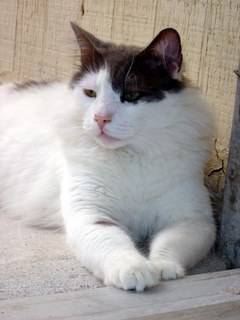Want to know an easy way to get donations of pet food to help the Food For People's Pets program? Plan a get together and encourage people to bring a bag of food for pets! It can be a party, a picnic, a silent auction, just about anything.
The Children's Clinics for Rehabilitative Services has an annual FamPet Picnic at a local park. People bring their families and their pets (generally dogs) and their own food. No big planning, just reserve a ramada at a local park (preferably one with enclosed dog-run areas) and have a meet and greet! Ask people to bring a bag of dog or cat food with them to be donated. That's it!
The CCRS picnic was this past Saturday at Reid Park in central Tucson. A lot of fun was had by all, and about 60 pounds of pet food was donated, with more to come from those who didn't make it to the picnic.
Check out one of the participant's blog (www.izziesworld.blogspot.com) for a slideshow of the fun, and get busy planning your own event!
Another easy way to help? Click on the "Food For People's Pets" Icon to the right and donate through "The Network for Good". You can designate this program from that site!
Wednesday, March 25, 2009
Monday, March 2, 2009
Poisoned Pet Help
I grew up with dogs. We had one dog during most times of my life. Skipper was a Golden Retriever, Irish Setter mix that we got as a puppy when I was about 2 years old. When I was about 8 or 10, we got Pepe, a purebred French Poodle that lasted about a month in our household; he bit, chewed, barked, and just plain reaked havoc in our household, so we'd given him to a family who would keep him as their only dog and actually train him (training a dog, imagine that!). When I was in high school and Skipper was about 15 years old my brother brought home a mixed breed dog whose owner was going to shoot because he didn't want her. Not too long after, Skipper died and Mandy was the only dog (possibly a pointer/lab mix or a greyhound/lab mix).
I now have a Cockeranian (Cocker Spaniel/Pomeranian mix, rescued almost three years ago). I never knew how many dangers there were in the world for dogs while growing up; my parents always took care of any problems that arose, which were few. Now, however, after adopting Izzie (a particularly ardent scavenger and chewer), I realize that there are many seemingly harmless things that dogs can get into that can actually make them sick, or worse, kill them. Like chocolate and grapes and onions and....well, you get the idea. I imagine there are many things that can harm a cat, too.
Tonight, from the Hermitage Cat Shelter home page, I found a link to "Cat Resources". From that page I followed a link entitled "Poison Control Center for Animals", and was from there led to the article "What To Do If Your Pet Is Poisoned". This is a very helpful website that is maintained by the ASPCA, who also runs the Poison Control Center for Animals. There's a phone number to call if you suspect your pet has been poisoned. There is a $60 fee for the consultation, but if it saves a pet's life, it's worth it. This site also tells you what information to have on hand when you call and, for free, lists items every household with pets should have for a first aid kit.
I urge you to visit this ASPCA site on poison control for pets. Being prepared is the best insurance against actually needing to be.
I hope you found this to be helpful, and I urge you to head over to the Network For Good badge to the right and donate to our Food For People's Pets program. You might just save a beloved pets life with your donation.
I now have a Cockeranian (Cocker Spaniel/Pomeranian mix, rescued almost three years ago). I never knew how many dangers there were in the world for dogs while growing up; my parents always took care of any problems that arose, which were few. Now, however, after adopting Izzie (a particularly ardent scavenger and chewer), I realize that there are many seemingly harmless things that dogs can get into that can actually make them sick, or worse, kill them. Like chocolate and grapes and onions and....well, you get the idea. I imagine there are many things that can harm a cat, too.
Tonight, from the Hermitage Cat Shelter home page, I found a link to "Cat Resources". From that page I followed a link entitled "Poison Control Center for Animals", and was from there led to the article "What To Do If Your Pet Is Poisoned". This is a very helpful website that is maintained by the ASPCA, who also runs the Poison Control Center for Animals. There's a phone number to call if you suspect your pet has been poisoned. There is a $60 fee for the consultation, but if it saves a pet's life, it's worth it. This site also tells you what information to have on hand when you call and, for free, lists items every household with pets should have for a first aid kit.
I urge you to visit this ASPCA site on poison control for pets. Being prepared is the best insurance against actually needing to be.
I hope you found this to be helpful, and I urge you to head over to the Network For Good badge to the right and donate to our Food For People's Pets program. You might just save a beloved pets life with your donation.
Subscribe to:
Comments (Atom)




